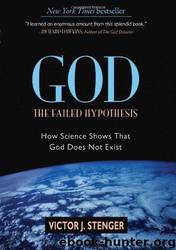God: The Failed Hypothesis by Stenger Victor

Author:Stenger, Victor [Stenger, Victor]
Language: eng
Format: epub
Tags: Non-Fiction, Philosophy, Religion, Science
ISBN: 9781591024811
Amazon: 1591024811
Barnesnoble: 1591024811
Goodreads: 98810
Publisher: Prometheus
Published: 2007-01-01T00:00:00+00:00
Chapter VI
The Failures of Revelation
bq._ If the statements it_ [the Bible] contains concerning matters of history and science can be proven by extrabiblical records, by ancient docu-ments recovered through archaeological digs, or by the established facts of modern science to be contrary to the truth, then there is grave doubt as to its trustworthiness in matters of religion. In other words, if the biblical record can be proved fallible in areas of fact that can be verified, then it is hardly to be trusted in areas where it cannot be tested.
—Archer L. Gleason1
Testing Revelation
The God of Jews, Christians, and Muslims is believed to communicate with humanity. Mystics of all faiths and in all ages have reported such communication. The knowledge they claim to have received from God fills religious literature. While much of the material is esoteric and not readily confirmable, we can reasonably expect that some revealed wisdom should be amenable to empirical verification. This is especially true for statements about the observable world and physical events. We should be able to find remarkable examples where specific information about the world, which was unknown to science at the time of the revelation, would later be confirmed by observation. We should also be able to find numerous cases of successful predictions of future events that have no plausible alternate explanation.
Instead we find the opposite. Scriptures and other records of claimed revelations contain many disagreements with science about the physical world. These are not just disagreements about “theories,” such as biological evolution as covered in chapter 2, but disagreements with now well-established empirical facts. (Well, evolution is an established empirical fact, too, but this has not stopped it from being politically controversial.)
Similarly, the records of claimed revelations contain no prediction of a future event that cannot be plausibly accounted for without recourse to the supernatural.
We will discuss three types of failures of revelation. In the first, we will see that no information supposedly gained during a mystical or religious experience, which could not have been otherwise known to the individual claiming the experience, has ever been confirmed. In the second type of revelation failure, the scriptures will be seen to contain gross errors of scientific fact.
Third, we will see that not a single risky biblical prophecy can be shown, by objective means, to have been fulfilled. Finally we will show that lack of physical evidence proves conclusively that important biblical tales, such as the Exodus and the events surrounding Jesus’ birth and death, cannot have occurred on the scale and manner described in the Bible. From all of this, it follows that the scriptures and reported religious experiences are not sources of revealed information.
Now, once again, standard scientific criteria are being applied in drawing these conclusions—the same criteria that are used to test all extraordinary claims. Personal testimonials and anecdotal stories have little or no value as evidence for the truth of extraordinary claims. Poorly controlled experiments are similarly useless.
Furthermore, predictions of future events have little or no value unless those predictions are risky, that is, they could have turned out otherwise.
Download
This site does not store any files on its server. We only index and link to content provided by other sites. Please contact the content providers to delete copyright contents if any and email us, we'll remove relevant links or contents immediately.
The Complete Stick Figure Physics Tutorials by Allen Sarah(7373)
Secrets of Antigravity Propulsion: Tesla, UFOs, and Classified Aerospace Technology by Ph.D. Paul A. Laviolette(5371)
Thing Explainer by Randall Munroe(3941)
The River of Consciousness by Oliver Sacks(3604)
The Order of Time by Carlo Rovelli(3194)
How To by Randall Munroe(3118)
A Brief History of Time by Stephen Hawking(3024)
I Live in the Future & Here's How It Works by Nick Bilton(2997)
What If?: Serious Scientific Answers to Absurd Hypothetical Questions by Randall Munroe(2705)
The Great Unknown by Marcus du Sautoy(2695)
Midnight in Chernobyl by Adam Higginbotham(2549)
Blockchain: Ultimate Step By Step Guide To Understanding Blockchain Technology, Bitcoin Creation, and the future of Money (Novice to Expert) by Keizer Söze(2496)
Networks: An Introduction by Newman Mark(2407)
The Meaning of it All by Richard Feynman(2355)
Easy Electronics by Charles Platt(2334)
The Tao of Physics by Fritjof Capra(2276)
Midnight in Chernobyl: The Untold Story of the World's Greatest Nuclear Disaster by Adam Higginbotham(2235)
Introducing Relativity by Bruce Bassett(2125)
When by Daniel H Pink(2118)
